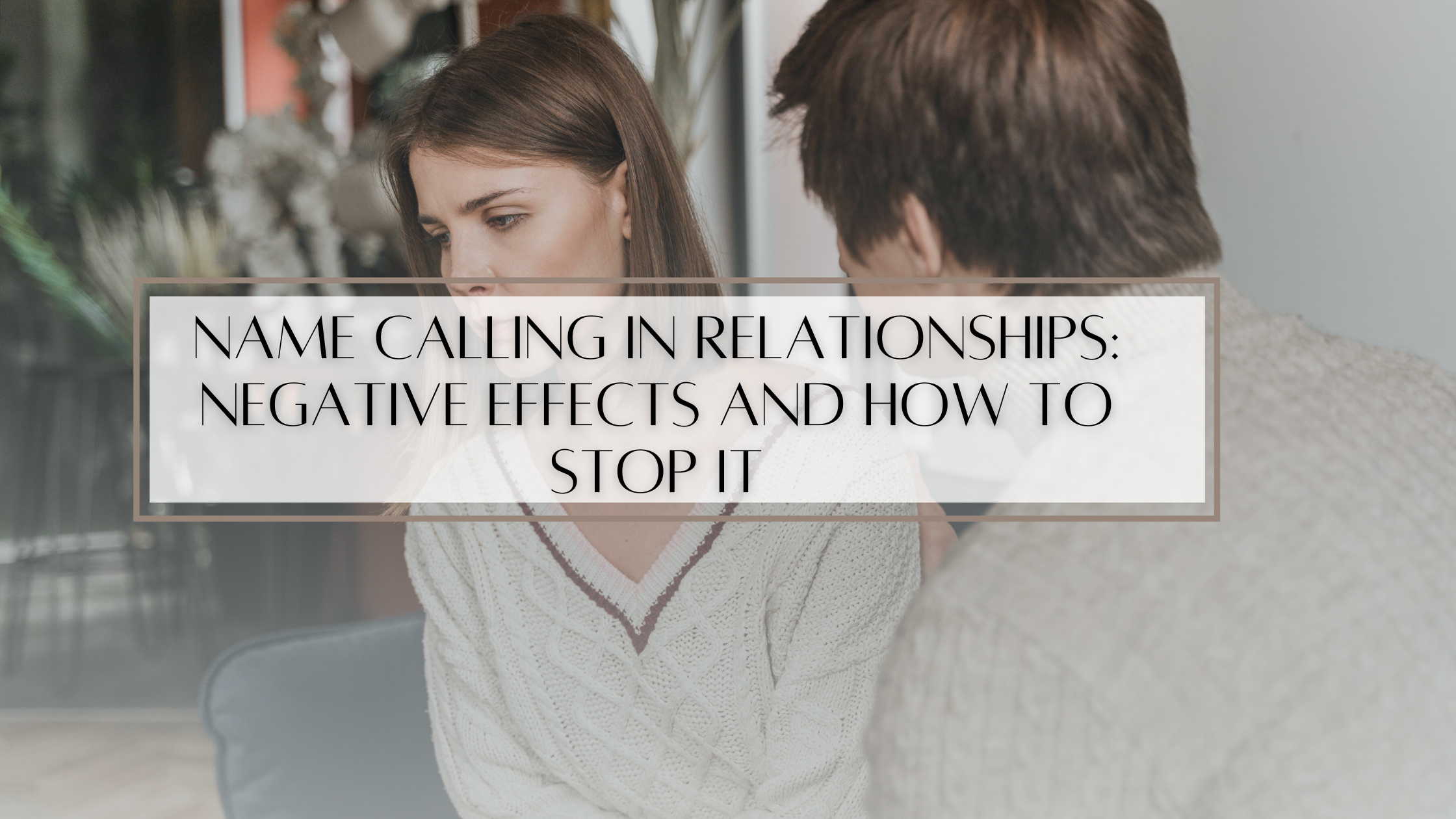Name Calling in Relationships: Negative Effects and How to Stop It
Words can heal, but they can also harm. In relationships, the things we say to each other hold incredible power. A kind word can reassure and comfort, while a cruel one can leave a lasting scar. When arguments turn into personal attacks or name calling, the foundation of mutual respect begins to weaken.
Many couples dismiss name calling as “just words” or a normal part of conflict, but it often points to deeper communication issues. What starts as a one-time insult can soon become a destructive pattern. Over time, these words can chip away at self-esteem, trust, and emotional safety.
Name calling in relationships is more than an emotional reaction; it is a form of verbal aggression. It signals a breakdown in empathy and communication, where anger takes over reason. Understanding why it happens, how it affects both partners, and what can be done to stop it is the first step to rebuilding a respectful and emotionally healthy bond.
What Is Name Calling in Relationships

Name calling is a communication behavior in which one partner uses insulting, belittling, or mocking language to criticize or control the other. It can be overt, like using harsh insults, or subtle, like sarcastic remarks that demean the other person.
Common examples include:
- “You’re so stupid.”
- “You always mess everything up.”
- “You’re being crazy.”
- “You’re useless.”
- “You sound pathetic.”
Even if such words are spoken in anger, they leave an emotional imprint. Over time, the recipient starts to internalize these labels, feeling unworthy or constantly on edge. What might seem like a quick outburst becomes a repeated pattern that damages emotional intimacy.
Name calling does not only happen in moments of rage. It can also show up in jokes, teasing, or “playful” banter that crosses boundaries. When a partner repeatedly uses humor to put the other down, it still carries the same emotional weight as open insults.
Why People Resort to Name Calling
No one enters a relationship intending to hurt the person they love. Yet under stress or conflict, some people resort to name calling as a way to express anger or regain control. Understanding the underlying reasons can help couples identify where the problem truly lies.
1. Poor Emotional Regulation
When emotions run high, people may lose control over their reactions. Instead of expressing frustration calmly, they lash out verbally. This is often because they have not learned healthy coping mechanisms to handle anger or disappointment. The insult becomes a quick way to discharge emotion, even if it hurts the other person.
2. Learned Behavior from Childhood
For many, communication patterns in adulthood mirror what they observed growing up. If a person was raised in an environment where shouting or insults were common, they may subconsciously repeat that behavior in their own relationships. They see it as a normal part of arguing, not realizing its damaging impact.
3. Power and Control Dynamics
Name calling in relationships can also be a form of emotional control. By insulting or belittling their partner, the aggressor tries to gain the upper hand in a disagreement. This behavior often reflects insecurity or fear of losing control rather than genuine dominance.
4. Defensiveness or Fear of Vulnerability
Sometimes, people use insults to protect themselves from feeling exposed or hurt. Rather than admitting fear, guilt, or sadness, they attack first. This shields their vulnerability but creates distance in the relationship.
5. Habitual Communication Patterns
Once name calling becomes a habit, it can be triggered easily, even during minor disagreements. Partners begin to associate conflict with hostility rather than problem-solving. Over time, it becomes part of how they communicate.
The Negative Effects of Name Calling
Name calling is not simply unpleasant; it has long-term psychological and relational consequences. Its effects extend beyond the argument, influencing how partners perceive each other and themselves.
1. Loss of Emotional Safety
Emotional safety is essential in any healthy relationship. It allows partners to be open, honest, and vulnerable without fear of ridicule. When name calling enters the picture, that safety disappears. The insulted partner begins to guard their emotions, avoiding genuine conversations to protect themselves.
2. Erosion of Self-Esteem
Hearing negative labels repeatedly can make a person start believing them. Phrases like “you’re worthless” or “you never do anything right” can damage self-image, leading to self-doubt and anxiety. This emotional erosion can persist long after the words are spoken.
3. Escalation of Conflict
Once name calling starts, arguments rarely stay focused on the issue at hand. Instead, they spiral into emotional battles filled with blame and resentment. The more partners insult each other, the less likely they are to resolve the actual problem.
4. Emotional and Psychological Distance
Name calling creates emotional barriers. The insulted partner may withdraw, suppress their feelings, or emotionally detach to avoid further pain. The relationship becomes marked by silence, coldness, and resentment instead of connection and care.
5. Normalization of Verbal Abuse
Repeated name calling can normalize verbal aggression. When insults become routine, they may escalate into more severe forms of emotional or psychological abuse. This can make one partner feel trapped in an unhealthy and unsafe relationship.
The Psychology Behind Name Calling

Psychologically, name calling is often rooted in projection and power struggles. Projection occurs when a person displaces their own feelings of inadequacy onto their partner. For instance, someone who feels insecure might call their partner “needy” or “clingy” to deflect their own emotions.
It also satisfies a temporary need for control. In arguments, when logic or empathy fails, people may resort to aggression to dominate the conversation. Unfortunately, this short-term emotional release comes at the cost of long-term relationship health.
Understanding this psychological cycle helps in breaking it. When couples learn to recognize the emotional triggers that lead to verbal attacks, they can replace destructive reactions with healthier communication tools.
How to Stop Name Calling in Relationships
Overcoming name calling requires self-awareness, effort, and consistent communication. Below are practical steps that can help couples rebuild respect and trust.
1. Pause and Reflect Before Responding
When anger rises, it’s easy to speak without thinking. Taking a pause before responding allows you to calm down and choose your words carefully. Simple grounding techniques, such as deep breathing or walking away for a few minutes, can prevent impulsive outbursts.
2. Identify Emotional Triggers
Understanding what triggers your anger helps you control it. Reflect on situations that make you feel attacked or defensive. Once you know your triggers, you can prepare healthier ways to respond, such as expressing feelings through “I” statements rather than accusations.
3. Replace Insults with Feelings
Instead of saying “You’re so selfish,” try expressing the underlying emotion: “I feel ignored when you don’t listen to me.” This shifts the conversation from blame to understanding and opens the door to problem-solving.
4. Set Boundaries Around Communication
Partners should agree on communication boundaries during conflicts. For example, decide that no personal attacks or name calling are acceptable, even during heated discussions. This shared rule promotes accountability and mutual respect.
5. Practice Active Listening
Many arguments escalate because one partner feels unheard. Active listening involves giving full attention, acknowledging the other person’s perspective, and responding with empathy. This simple act can defuse tension and reduce the urge to retaliate.
6. Seek Counseling or Therapy if Needed
Sometimes, breaking a long-term communication pattern requires professional help. Couples therapy can help partners understand their emotional dynamics and develop new ways to communicate. A therapist can provide tools to manage anger, rebuild trust, and strengthen emotional connection.
7. Reinforce Positive Communication
It’s not enough to stop name calling; couples must actively cultivate kindness. Express appreciation, use positive affirmations, and acknowledge efforts. Small acts of verbal support rebuild emotional safety over time.
Checklist: Are You Engaging in Name Calling?

Use this quick checklist for self-reflection:
- Do I use insults or sarcasm during arguments?
- Do I criticize my partner’s character rather than their actions?
- Do I bring up past mistakes to win arguments?
- Do I joke at my partner’s expense?
- Do I feel the need to “win” every disagreement?
If you answered “yes” to several of these, it may be time to reassess your communication style. Awareness is the first step toward change.
Rebuilding Trust After Name Calling
If name calling has damaged your relationship, rebuilding trust takes time and consistency. Apologies should be sincere, not defensive. More importantly, behavior must change. Trust returns when words and actions align.
Partners should also focus on forgiveness, not as a one-time act but as an ongoing process. Forgiveness does not mean forgetting the hurt; it means choosing to move forward with empathy and effort. Restoring emotional closeness often requires patience, consistent communication, and mutual commitment to change.
Conclusion
Name calling in relationships may seem like a small part of arguments, but its effects can linger for years. It damages emotional intimacy, self-esteem, and the overall health of a relationship. Understanding its roots helps couples replace hurtful communication with empathy and respect.
A loving relationship thrives on emotional safety, understanding, and honest communication. When both partners commit to speaking with kindness, even in disagreement, they create a foundation that can withstand conflict and nurture connection.
Healing begins with awareness and intention. Choosing better words is not just about avoiding harm; it’s about building a partnership where both people feel valued, respected, and emotionally secure.

Leave a Reply